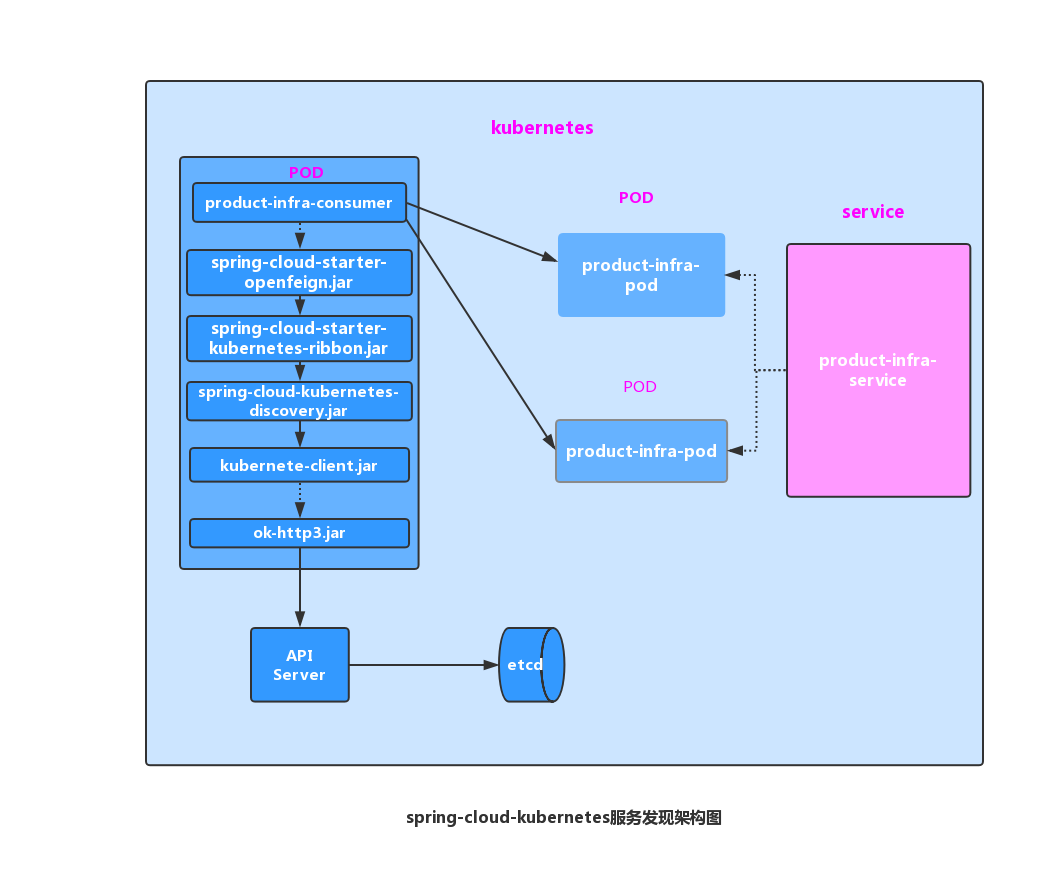通常情况下,我们的线上的服务在迁移到k8s环境下的时候,都是采用平滑迁移的方案。服务治理与注册中心等都是采用原先的组件。比如spring cloud应用,在k8s环境下还是用原来的一套注册中心(如eureka),服务治理(hystrix,ribbon)等。但是当我们开发新的应用时,我们是可以借助于sping-cloud-kubernetes组件为我们提供的服务发现、负载均衡等来摈弃像eureka这样的注册中心。本文主要通过构建两个spring cloud 服务来演示spring-cloud-kubernetes组件如何做服务的发现,负载均衡等。
一、使用spring-cloud-kubernetes做服务发现
分别开发两个服务,服务提供者:product_infra_service, 并通过FeignClient的方式对外提供接口,供消费者调用。服务消费者:product_infra_consumer.
首先新建一个module:product-infra-service-api:该项目中配置pom文件的相关依赖如下:
<dependencies> <dependency> <groupId>org.springframework.boot</groupId> <artifactId>spring-boot-starter</artifactId> </dependency> <!--Service Interface API--> <!--Feign--> <dependency> <groupId>org.springframework.cloud</groupId> <artifactId>spring-cloud-starter-openfeign</artifactId> <version>2.1.3.RELEASE</version> </dependency> </dependencies>
该项目中定义接口如下:
@FeignClient(name="${feign.product-infra.name:product-infra-service}",fallback = PropertyClientFallback.class)
public interface PropertyClient { @GetMapping(value="properties") List<String> getProperties(); }
hystrix的fallback类定义如下:
@Component public class PropertyClientFallback implements PropertyClient{ @Override public List<String> getProperties() { return new ArrayList<String>(); } }
接下来,新建服务提供者 product-infra-service项目,在该项目中实现PropertyClient接口。pom文件依赖配置如下:
<dependencies>
<dependency>
<groupId>org.springframework.boot</groupId>
<artifactId>spring-boot-starter</artifactId>
</dependency>
<dependency>
<groupId>org.springframework.boot</groupId>
<artifactId>spring-boot-starter-test</artifactId>
<scope>test</scope>
<exclusions>
<exclusion>
<groupId>org.junit.vintage</groupId>
<artifactId>junit-vintage-engine</artifactId>
</exclusion>
</exclusions>
</dependency>
<!--Service Interface API-->
<dependency>
<groupId>com.maidao.center.product_infra</groupId>
<artifactId>product-infra-service-api</artifactId>
<version>1.0.0-SNAPSHOT</version>
</dependency>
<dependency>
<groupId>org.springframework.boot</groupId>
<artifactId>spring-boot-starter-web</artifactId>
</dependency>
<!--SpringBoot Actuator-->
<dependency>
<groupId>org.springframework.boot</groupId>
<artifactId>spring-boot-starter-actuator</artifactId>
</dependency>
</dependencies>
定义controller 类如下:
@RestController @RequestMapping public class PropertyController implements PropertyClient{ @GetMapping("properties") public List<String> getProperties(){ ArrayList<String> properties = new ArrayList<>(); properties.add("properties1"); properties.add("properties2"); return properties; } }
编译打包成镜像后将项目部署到k8s环境,并在k8s环境下定义服务pod实例所关联到的service:本例中定义k8s service name 为 product-infra-service(与定义的应用名相同).
新建消费者项目:product-infra-consumer,pom文件配置依赖如下:
<dependencies>
<dependency>
<groupId>org.springframework.boot</groupId>
<artifactId>spring-boot-starter</artifactId>
</dependency>
<dependency>
<groupId>org.springframework.boot</groupId>
<artifactId>spring-boot-starter-test</artifactId>
<scope>test</scope>
<exclusions>
<exclusion>
<groupId>org.junit.vintage</groupId>
<artifactId>junit-vintage-engine</artifactId>
</exclusion>
</exclusions>
</dependency>
<dependency>
<groupId>org.springframework.cloud</groupId>
<artifactId>spring-cloud-kubernetes-core</artifactId>
<version>${springcloud.kubernetes.version}</version>
</dependency>
<dependency>
<groupId>org.springframework.cloud</groupId>
<artifactId>spring-cloud-kubernetes-discovery</artifactId>
<version>${springcloud.kubernetes.version}</version>
</dependency>
<dependency>
<groupId>org.springframework.cloud</groupId>
<artifactId>spring-cloud-starter-kubernetes-ribbon</artifactId>
<version>${springcloud.kubernetes.version}</version>
</dependency>
<dependency>
<groupId>org.springframework.cloud</groupId>
<artifactId>spring-cloud-commons</artifactId>
<version>${springcloud.version}</version>
</dependency>
<dependency>
<groupId>org.springframework.boot</groupId>
<artifactId>spring-boot-starter-web</artifactId>
<version>${springcloud.version}</version>
</dependency>
<dependency>
<groupId>org.springframework.cloud</groupId>
<artifactId>spring-cloud-starter-netflix-ribbon</artifactId>
<version>${springcloud.version}</version>
</dependency>
<dependency>
<groupId>org.springframework.cloud</groupId>
<artifactId>spring-cloud-starter-netflix-hystrix</artifactId>
<version>${springcloud.version}</version>
</dependency>
<!--Service Interface API-->
<dependency>
<groupId>com.maidao.center.product_infra</groupId>
<artifactId>product-infra-service-api</artifactId>
<version>1.0.0-SNAPSHOT</version>
</dependency>
</dependencies>
应用配置如下:
server:
port: 8080
product-infra-service:
ribbon:
KubernetesNamespace: ${namespace} (k8s namespace,实际根据自己服务部署的namespace配置对应的名字)
backend:
ribbon:
eureka:
enabled: false
client:
enabled: true
ServerListRefreshInterval: 5000
hystrix:
command:
BackendCall:
execution:
isolation:
thread:
timeoutInMilliseconds: 5000
threadpool:
BackendCallThread:
coreSize: 5
feign:
hystrix:
enabled: true
新建ProductInfraConsumerController类:通过PropertyClient的引用调用提供者提供的接口。
@RestController
@RequestMapping
public class ProductInfraConcumerController {
@Autowired
private PropertyClient propertyClient;
@GetMapping("properties")
public List<String> getProductProperties(){
return propertyClient.getProperties();
}
}
可以看到代码没有变化,调用方式没有变化,在消费者项目中去掉了原先的EurekaClient发现服务的调用。服务发现机制采用的是,spring-cloud-kubernetes-discovery。负载均衡组件采用的是:spring-cloud-starter-kubernetes-ribbon。
最后将product-infra-consumer编译打包成镜像后,部署到k8s环境下。
最后通过curl 命令在k8s环境下调用product-infra-consumer的controller方法来测试服务之间的通信:如下所示:
[root@iZbp174tf9563rykf3bbjjZ ~]# curl http://172.30.28.100:8080/properties
["properties1","properties2"]
停掉product-infra-service服务,再次发起请求,降级fallback方法生效:
[root@iZbp174tf9563rykf3bbjjZ ~]# curl http://172.30.28.98:8080/properties []
可以看到在没有eureka注册中心的情况下,定义的两个服务能够正常通信,且代码不需要做任何变动,只需要在消费者服务中引入spring-cloud-kubernetes相关依赖即可,spring-cloud-kubernetes组件起到了服务发现以及负载均衡的作用。
二、spring-cloud-kubernetes 服务发现流程
spring-cloud-kubernetes框架提供了调用kubernetes的原生能力来为现有SpringCloud应用提供服务,架构如下图所示:

从上图可以看出product-infra-consumer在调用product-infra-service时,通过FeignClient组件拿到service name信息,最底层通过ok-http3,根据service name 调用 api server 获取该service下对应的Pod信息,拿到Pod信息后通过,轮询的方式向这些pod发送请求。spring-cloud-starter-kubernetes-ribbon组件中的KubernetesServerList 继承了 ribbon-loaderbanlancer组件中的AbstractServerList以及实现了 ServerList类中的方法,并通过 KubernetesClient提供的能力向k8s api server 发送请求信息。通过服务名获取pod信息的源码如下:
public List<Server> getUpdatedListOfServers() { Endpoints endpoints = this.namespace != null ? this.client.endpoints().inNamespace(this.namespace) .withName(this.serviceId).get() : this.client.endpoints().withName(this.serviceId).get(); List<Server> result = new ArrayList<Server>(); if (endpoints != null) { if (LOG.isDebugEnabled()) { LOG.debug("Found [" + endpoints.getSubsets().size() + "] endpoints in namespace [" + this.namespace + "] for name [" + this.serviceId + "] and portName [" + this.portName + "]"); } for (EndpointSubset subset : endpoints.getSubsets()) { if (subset.getPorts().size() == 1) { EndpointPort port = subset.getPorts().get(FIRST); for (EndpointAddress address : subset.getAddresses()) { result.add(new Server(address.getIp(), port.getPort())); } } else { for (EndpointPort port : subset.getPorts()) { if (Utils.isNullOrEmpty(this.portName) || this.portName.endsWith(port.getName())) { for (EndpointAddress address : subset.getAddresses()) { result.add(new Server(address.getIp(), port.getPort())); } } } } } } else { LOG.warn("Did not find any endpoints in ribbon in namespace [" + this.namespace + "] for name [" + this.serviceId + "] and portName [" + this.portName + "]"); } return result; }